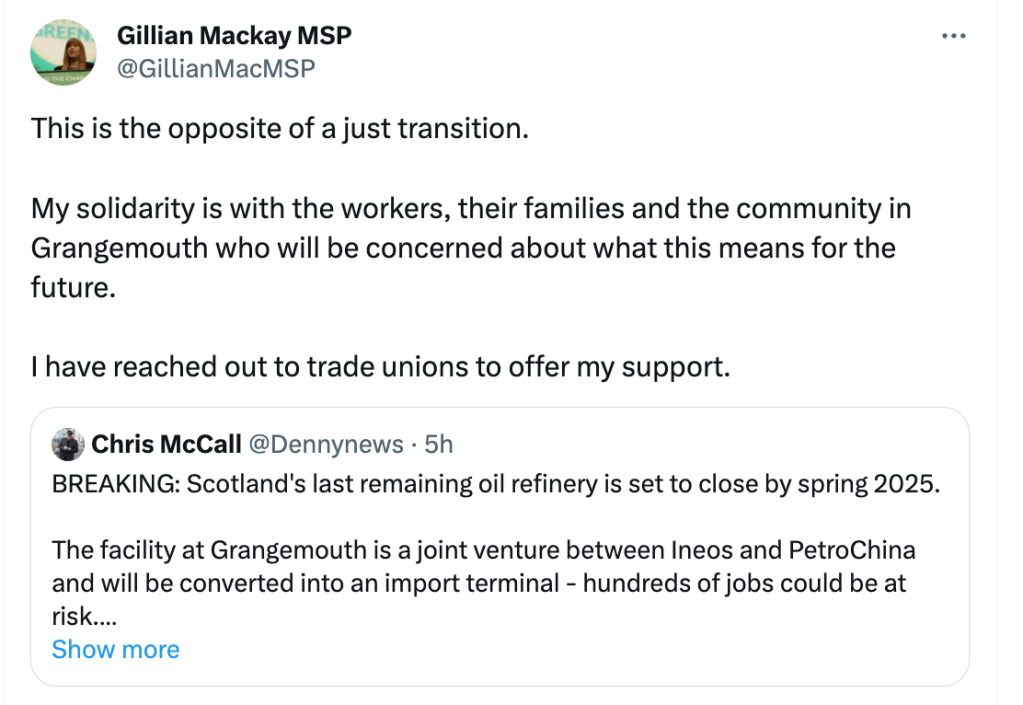‘Well, well, well,’ as the meme goes. ‘If it isn’t the consequences of my own actions.’
The news that Grangemouth, Scotland’s last oil refinery, is to close by 2025, with hundreds of jobs thought to be at risk, has elicited statements of concern from across the political spectrum. But no one is likely to improve upon that from Scottish Green MSP Gillian Mackay, who posted on Twitter/ X:

There couldn’t be a more dazzling display of radical cluelessness. Mackay’s party, which is in government with Humza Yousaf’s SNP in Scotland, has made a crusade of harrying the oil and gas industry out of operation north of the border.
Earlier this month, when the King’s Speech confirmed an annual system of awarding oil and gas licences, the Scottish Greens accused the government of an ‘obsession for fossil fuels’ and said ‘the simple scientific fact is that new oil and gas licences are a disaster for our planet’s future’. The party condemned the Prime Minister for ‘his support of oil and gas during a climate crisis’.
In October, when Rishi Sunak announced 27 new oil and gas licences for the North Sea, Green environment spokesman Mark Ruskell MSP called it ‘an environmental disaster’, said there was ‘no sustainable future in endless oil and gas drilling’ and insisted we ‘urgently need to reduce our dependence on fossil fuels’.
Greens are getting what they want but not the way they wanted
In September, co-leader Patrick Harvie, the minister for zero-carbon buildings in Yousaf’s government, gave a speech to the Scottish Renewables Heat Summit. He spoke of the need for an ‘urgent transition from the fossil fuel age’ and said moves away from oil and gas based heating were ‘an opportunity to liberate people from dependence on fossil fuels’.
The same month, Harvie’s co-leader Lorna Slater, also a Scottish government minister, issued a statement calling for people to attend a rally against oil and gas. The statement’s headline: ‘No more fossil fuels — join the march today.’ Her colleague Maggie Chapman MSP called for spending ‘focused on green solutions to wean us off fossil fuels’.
In May, Ruskell urged ‘a significant, generational shift’ in the levels of tax imposed on oil and gas companies ‘to send a clear message that these firms have to pay a price for such obscene profits made on the back of their climate wrecking activities’.
That same month, he greeted UK Government support for a proposed new oil and gas field by declaring that ‘we will oppose the self-destruction of approving any new oil and gas development at every turn’ and boasting that the Greens ‘ensured the Scottish Government’s draft energy strategy includes a presumption against no new oil and gas fields in the North Sea’.
These are just a few examples. There are many, many more. In their actions in government and in their political campaigning, the Scottish Greens have agitated for an end to oil and gas production in Scotland. Now they are getting what they want but not the way they wanted it.
As though it was possible to make such a sudden, fundamental change to an industry without producing unintended consequences. As though ‘just transition’ was ever anything other than a poll-tested slogan, no different from those deployed by successive Westminster governments during deindustrialisation of the UK’s coal, steel and manufacturing heartlands.
The Scottish Greens are entitled to campaign for the urgent abandonment of oil and gas. It’s no more or less legitimate than any of their other policies. But it takes mesmerising incuriosity to advocate the closure of an industry without bothering to study how said industry operates and how closure would likely play out. Such are the joys of being a progressive. When you know you’re virtuous, you don’t need to know anything else.
The old left had its faults but I’d take it over the new left any day. The old left knew about industry, jobs, the dignity of labour, and the material conditions of life. The new left is interested only in image, text, symbols and interpretation — postmodernism as a political platform. And what could be more postmodern than agitating for a plan that will inevitably mean people lose their jobs then proffering your solidarity when they do, like Margaret Thatcher’s industrial policy as rewritten by Kurt Vonnegut.
Gillian Mackay says she has approached the trade unions ‘to offer my support’. Perhaps she and her colleagues might consider offering their resignations instead.







Comments